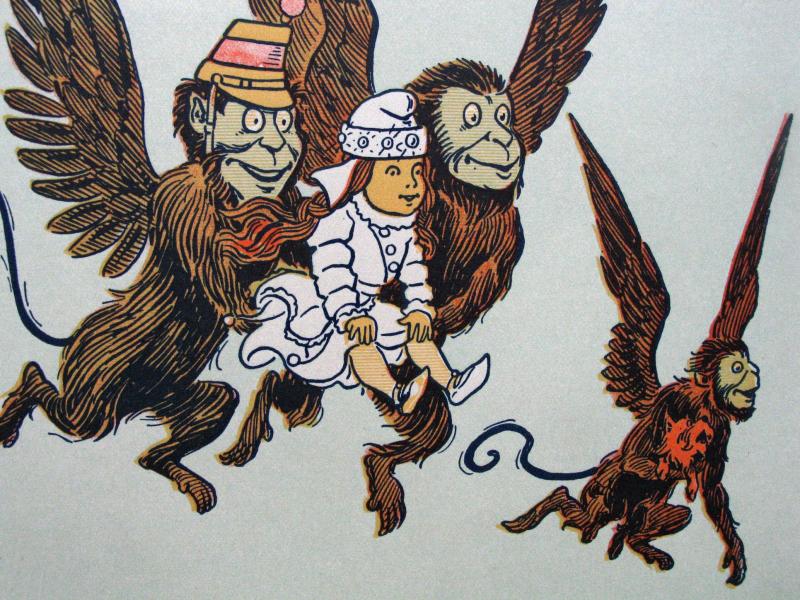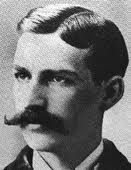The Wonderful Wizard of Oz – The True Story, BBC Four | reviews, news & interviews
The Wonderful Wizard of Oz – The True Story, BBC Four
The Wonderful Wizard of Oz – The True Story, BBC Four
An engrossing, detailed documentary with one significant omission

“There’s no place like home… there’s no place like home… there’s no place like home…” A wish became a mantra and then became a happy ending, when Dorothy wiggled her ruby-red shoes in the MGM movie version of L Frank Baum’s fairy story. But this documentary didn’t even get to the most watched film in the history of cinema until its closing 10 minutes: perhaps because its makers were concerned that if they’d called it “The Story of L Frank Baum” it wouldn’t have found an audience.
And that would have been a pity because Baum’s story, as told by his great grandson, great granddaughter and various literary and movie scholars, is an engrossingly eventful one. This New York-born entrepreneur was a baseball player, a photographer, an inventor, a newspaper editor and department store owner. In fact he didn’t even start writing in earnest until a decline in his health during old age. But there can be no understanding of The Wizard of Oz’s position in our culture without some knowledge of the man who created this almost myth-like template for the American Dream, way back at the turn of the 20th century.
Baum got the name of his fantasy kingdom from glancing at the 'O-to-Z label on his filing cabinet
It turns out that Dorothy – the still centre of the Oz tornado of flying monkeys and evil witches – was at the time the book’s most controversial ingredient. It wasn’t the fact that she was the first young girl to be placed at the centre of a narrative; it was the fact that she was such a spirited, independent girl (due in part, it was said, to the influence Baum’s wife, mother and mother-in-law had - all of whom were involved in the suffragette movement). In fact, so unthinkably precocious was her character - in this era when it was still thought that a child should be seen but not heard - that the Oz books were banned by many public libraries.
 However, what I found most fascinating wasn’t the grand overarching story of this generously moustachioed entrepreneur’s numerous and inventive attempts to make a living to support his family, but the little incidental details along the way which later contributed to the making of such an era-defining work of art as The Wizard of Oz. For example, the idea that Baum (pictured right) got the name of his fantasy kingdom from glancing at the “O-to-Z” label on his filing cabinet, thus supporting Pasteur’s dictum that “chance favours the prepared mind”. Then there was the story that while working as editor of The Aberdeen Saturday Pioneer he had become obsessed by a news story about a house that had been uprooted by a tornado and then landed, still intact, two miles away. Not to mention the mannequin Baum constructed out of tin to function as an eye-catching attraction in the window of the department store he owned before the Great Depression bankrupted him.
However, what I found most fascinating wasn’t the grand overarching story of this generously moustachioed entrepreneur’s numerous and inventive attempts to make a living to support his family, but the little incidental details along the way which later contributed to the making of such an era-defining work of art as The Wizard of Oz. For example, the idea that Baum (pictured right) got the name of his fantasy kingdom from glancing at the “O-to-Z” label on his filing cabinet, thus supporting Pasteur’s dictum that “chance favours the prepared mind”. Then there was the story that while working as editor of The Aberdeen Saturday Pioneer he had become obsessed by a news story about a house that had been uprooted by a tornado and then landed, still intact, two miles away. Not to mention the mannequin Baum constructed out of tin to function as an eye-catching attraction in the window of the department store he owned before the Great Depression bankrupted him.
Eventually we got to MGM’s rich Technicolor jewel of a film. The Wizard of Oz was a yellow brick road movie which began and ended at home - which of course is where the American heart is. It was interesting to consider that my own ambivalent attitude towards this film – both as a child and as an adult – wasn’t entirely subjective and unfounded. There seems to be little doubt that the atmosphere of foreboding that permeates every frame of Oz - despite the choreographed jollity and uplifting songs - was a result of the fact that while the film was being made (1937-38), war was on the way, and Baum’s innocent utopian vision of home sweet home could no longer be taken for granted. So, long before the doomed post-Oz Garland would retrospectively cast a melancholy shadow over the child star Garland - the luminescent film star herself was out entertaining the homesick troops with their favourite song, “Somewhere Over the Rainbow”, while those same troops sang “We’re Off to See the Wizard” as they marched into combat.
I did have one gripe though. Given that this was a BBC film and not an American production, I was surprised that there was no mention of the fact that our very own precocious but grounded Alice was skipping around Lewis Carroll’s Wonderland some 35 years before dear Dorothy was wafted off to Oz. We were told that Baum loved Dickens, so surely he would also have been aware of Carroll and his similarly absurdist land peopled by unlikely creatures and a headstrong little girl? If Baum hadn’t been painted throughout this documentary as such an innovator this could have been forgiven - but must every corner of history get rewritten to favour our US cousins?
Share this article
Add comment
The future of Arts Journalism
You can stop theartsdesk.com closing!
We urgently need financing to survive. Our fundraising drive has thus far raised £49,000 but we need to reach £100,000 or we will be forced to close. Please contribute here: https://gofund.me/c3f6033d
And if you can forward this information to anyone who might assist, we’d be grateful.

Subscribe to theartsdesk.com
Thank you for continuing to read our work on theartsdesk.com. For unlimited access to every article in its entirety, including our archive of more than 15,000 pieces, we're asking for £5 per month or £40 per year. We feel it's a very good deal, and hope you do too.
To take a subscription now simply click here.
And if you're looking for that extra gift for a friend or family member, why not treat them to a theartsdesk.com gift subscription?
more TV
 Blu-ray: The Sweeney - Series One
Influential and entertaining 1970s police drama, handsomely restored
Blu-ray: The Sweeney - Series One
Influential and entertaining 1970s police drama, handsomely restored
 I Fought the Law, ITVX review - how an 800-year-old law was challenged and changed
Sheridan Smith's raw performance dominates ITV's new docudrama about injustice
I Fought the Law, ITVX review - how an 800-year-old law was challenged and changed
Sheridan Smith's raw performance dominates ITV's new docudrama about injustice
 The Paper, Sky Max review - a spinoff of the US Office worth waiting 20 years for
Perfectly judged recycling of the original's key elements, with a star turn at its heart
The Paper, Sky Max review - a spinoff of the US Office worth waiting 20 years for
Perfectly judged recycling of the original's key elements, with a star turn at its heart
 The Guest, BBC One review - be careful what you wish for
A terrific Eve Myles stars in addictive Welsh mystery
The Guest, BBC One review - be careful what you wish for
A terrific Eve Myles stars in addictive Welsh mystery
 theartsdesk Q&A: Suranne Jones on 'Hostage', power pants and politics
The star and producer talks about taking on the role of Prime Minister, wearing high heels and living in the public eye
theartsdesk Q&A: Suranne Jones on 'Hostage', power pants and politics
The star and producer talks about taking on the role of Prime Minister, wearing high heels and living in the public eye
 King & Conqueror, BBC One review - not many kicks in 1066
Turgid medieval drama leaves viewers in the dark
King & Conqueror, BBC One review - not many kicks in 1066
Turgid medieval drama leaves viewers in the dark
 Hostage, Netflix review - entente not-too-cordiale
Suranne Jones and Julie Delpy cross swords in confused political drama
Hostage, Netflix review - entente not-too-cordiale
Suranne Jones and Julie Delpy cross swords in confused political drama
 In Flight, Channel 4 review - drugs, thugs and Bulgarian gangsters
Katherine Kelly's flight attendant is battling a sea of troubles
In Flight, Channel 4 review - drugs, thugs and Bulgarian gangsters
Katherine Kelly's flight attendant is battling a sea of troubles
 Alien: Earth, Disney+ review - was this interstellar journey really necessary?
Noah Hawley's lavish sci-fi series brings Ridley Scott's monster back home
Alien: Earth, Disney+ review - was this interstellar journey really necessary?
Noah Hawley's lavish sci-fi series brings Ridley Scott's monster back home
 The Count of Monte Cristo, U&Drama review - silly telly for the silly season
Umpteenth incarnation of the Alexandre Dumas novel is no better than it should be
The Count of Monte Cristo, U&Drama review - silly telly for the silly season
Umpteenth incarnation of the Alexandre Dumas novel is no better than it should be
 The Narrow Road to the Deep North, BBC One review - love, death and hell on the Burma railway
Richard Flanagan's prize-winning novel becomes a gruelling TV series
The Narrow Road to the Deep North, BBC One review - love, death and hell on the Burma railway
Richard Flanagan's prize-winning novel becomes a gruelling TV series
 The Waterfront, Netflix review - fish, drugs and rock'n'roll
Kevin Williamson's Carolinas crime saga makes addictive viewing
The Waterfront, Netflix review - fish, drugs and rock'n'roll
Kevin Williamson's Carolinas crime saga makes addictive viewing

Comments
...